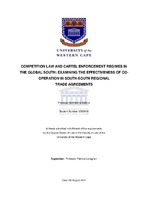Competition law and cartel enforcement regimes in the global south: examining the effectiveness of co-operation in south-south regional trade agreements.
Abstract
Competition law and its enforcement have become necessary tools in the face of trade liberalisation.
Nowhere is this more evident than in the area of cross-border cartels. The global South is steadily
becoming aware of this. With the advent of globalisation and trade liberalisation, individual economies
have become intrinsically linked. Anti-competitive conduct in one territory may have an impact in
another territory. Therefore, an effective regional competition law framework complements trade
liberalisation, especially in light of the principal objective of the South-South regional economic
communities: the deepening of regional integration, in order to realise economic development and
alleviate poverty.
Cartel practices, such as, market allocation cartels, are in direct contradiction to this primary objective.
This is when enforcement collaborations in South-South regional economic communities becomes
crucial. The regional legal instruments of the Common Market for Eastern and Southern Africa, the
East African Community, the Southern African Customs Union and the Southern African Development
Community make provision for enforcement collaborations among Member States. To facilitate
collaboration, regional competition authorities have been created to investigate, among other things,
cross-border cartels. Within these economic communities, there is a strong case for enforcement
collaborations, as evidence shows that the majority of the firms engaging in cartels are the so-called
Regional Multinational Corporations. They operate throughout the territories of Member States.
Additionally, the international nature of cartels, such as, private international cartels and export
cartels, provide an opportunity for South-South co-operation to be utilised. However, this co-operation
has not been utilised to the fullest extent, especially with reference to cross-border cartel activities.
This has been attributed to various factors, such as, institutional incapacities, resource austerity, the
absence of common procedural rules, the lack of adequate investigatory tools, and political ineptitude.
As a solution, this current study makes specific recommendations that are directed at enhancing the
effectiveness of South-South collaborations pertaining to cross-border cartel activities.

